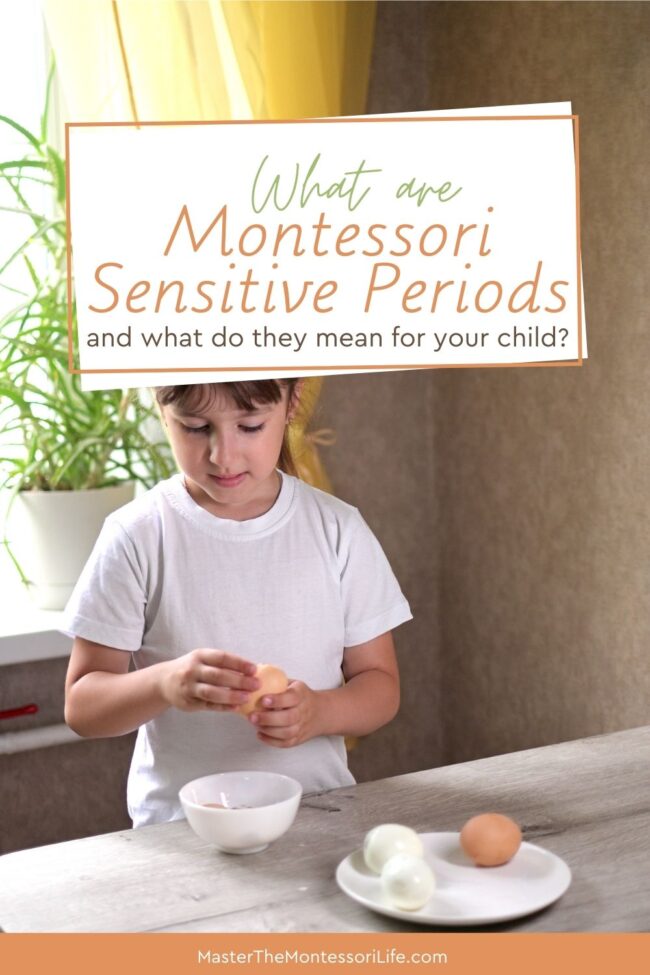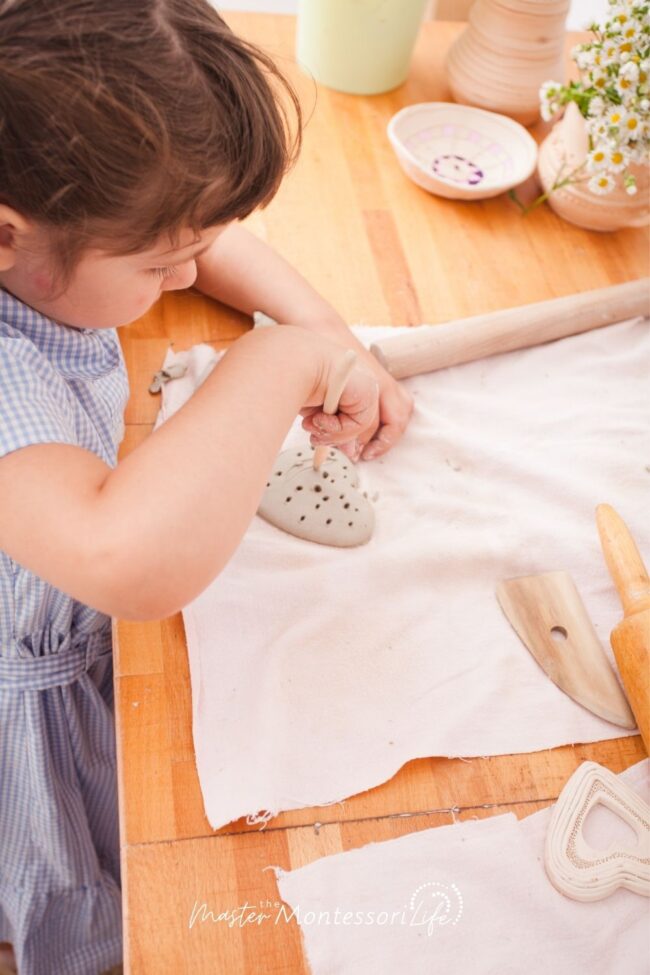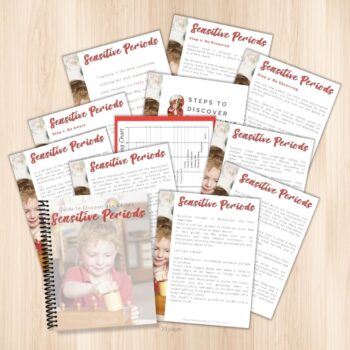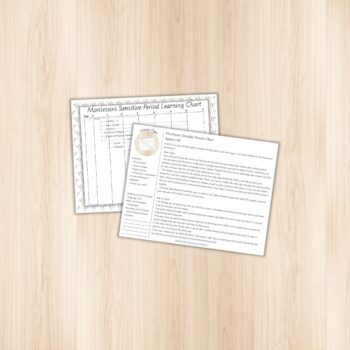By following the Montessori sensitive periods, you can help your child reach their fullest potential in their early years!
Montessori sensitive periods are time ranges or windows of opportunity when a child is more likely to be open to learn certain developmental skills.
These phases of development are important guides in Montessori at home life, as you can easily introduce concepts during these times without having to guess when your child is ready.
Each sensitive period has its own unique characteristics that can be helpful in guiding your child’s learning experience in Montessori classrooms.
Each sensitive period represents an important milestone in a child’s development, so it’s crucial to be aware of them and plan your child’s learning activities accordingly.
By following the Montessori sensitive periods, you can help your child reach their fullest potential in their early years!

What Montessori Sensitive Periods are
Each sensitive period represents an important milestone in a child’s development, so it’s crucial to be aware of them and plan your child’s learning activities accordingly.
By following the Montessori sensitive periods, you can help your child reach their fullest potential!
Sensitive periods, some call them phases of development (but this is something different that I discuss inside The Montessori Way Foundations Framework), are specific time frames in a child’s life when they are more open to learn certain skills.
Sensitive Periods and how they guide Montessori learning
Each sensitive period has its own unique characteristics that can be helpful in guiding your child’s learning experience in their early years of life.
For example, the sensitive period for movement and dexterity usually occurs during the toddler years as they learn to handle small objects.
This is the perfect time to introduce opportunities for your child to move and explore their environment and hit developmental milestones.
The sensitive period for language usually occurs during the preschool years, and this is a great time to start introducing reading and writing activities.
The sensitive period for cognition usually occurs during the school-age years, and this is a great time to start introducing math and science activities.

Guide to Discover the Child’s Sensitive Periods Digital Book
$9.99
This 20-page digital book will share with you through what Montessori Sensitive Periods are and walk you through eight actionable steps to get you to a better place for detecting and recognizing the child’s Sensitive Periods.
EU buyers, go here.
The characteristics of some Sensitive Periods
There are many Sensitive Periods that open and close in a child’s life, but here are three in Montessori education:
Practical Life:
This sensitive period covers from birth to about 3 years old, during which a child is constantly exploring their environment and learning through hands-on activities.
It’s important to provide opportunities for exploration and allow your child to practice skills such as dressing themselves, pouring liquids, and using utensils.
Sensory:
This phase of development lasts from about 3 to 6 years old, when a child’s senses are highly stimulated, especially with the hands-on Montessori materials.
During this time it’s important to provide plenty of opportunities for sensory exploration, such as using different textures, smelling new spices, and feeling different fabrics.
Cognitive:
This sensitive period usually begins around 6 years old and lasts through adolescence.
During this time, a child’s brain is growing rapidly and they are eager to learn new information in the prepared environment and in real life.
This is the perfect time to start introducing academic concepts such as math and science in the Montessori school and at home.

Examples of how to take advantage of several Sensitive Periods
One way to take advantage of the sensitive period for movement and dexterity is by providing opportunities for your child to move around.
This could mean letting them play outside in the park, going on nature walks, or even just having a large open space in your home where they can run around.
Another way to take advantage of the sensitive period for language is by reading books together and talking about the stories.
You can also start writing simple sentences and have your child copy them because children are learning from you.
And, of course, get them started on learning how to spell their name and other basic words!
The sensitive period for cognition is a great time to start introducing math and science activities.
You can do this by playing games that involve counting or solving problems, or even by doing experiments at home.
Just make sure that the activities are age-appropriate and challenging enough to hold your child’s interest as their sensitive periods occur.
By following the Montessori sensitive periods, you can help your child reach their fullest potential in the mixed age classroom!
Take a look at the great resources below. They were specifically created to target the topic of Sensitive Periods.
The importance of following the Montessori sensitive periods for child development
In conclusion, following the sensitive periods in The Montessori Method (created by Dr. Maria Montessori) is an important way to help your child reach their fullest potential.
Each sensitive period represents a unique milestone in a child’s development, so it’s crucial to be aware of them and plan your child’s learning activities accordingly.
By providing opportunities for hands-on learning and sensory exploration during each phase, you can help your child excel in all areas of life! Thanks for reading!
For more information on Montessori sensitive periods, visit this link.
There, you will find an essential definition of Montessori sensitive periods development as well as information about each individual phase.
With this knowledge, you can create a more tailored learning experience for your child that corresponds with their natural abilities and tendencies!

Guide to Discover the Child’s Sensitive Periods
Now that I have given you information about the children’s sensitive periods, it is time for you to take it to the next level and snatch this guide to discover your child’s sensitive periods!
You might also enjoy these relevant topics:
- Teaching Addition the Montessori Way: A Guide to Making Math Engaging for Children
 This blog post will explore three key points that outline the Montessori method of teaching addition.
This blog post will explore three key points that outline the Montessori method of teaching addition. - Teaching Sight Words the Montessori Way
 This training will explain how parents and teachers can use the Montessori approach to teaching sight words in an effective and engaging way.
This training will explain how parents and teachers can use the Montessori approach to teaching sight words in an effective and engaging way. - Montessori Art Collection: Set 1 (1300s-1500s) 3-Part Cards
 Introduce your child to the splendor of classic European art with our Montessori Art Set 1 (1300s-1500s) 3-Part Cards.
Introduce your child to the splendor of classic European art with our Montessori Art Set 1 (1300s-1500s) 3-Part Cards.







Leave a Reply